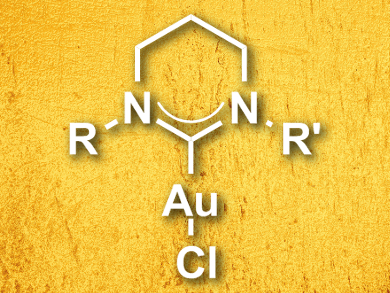N-heterocyclic carbenes (NHCs) have a wide range of applications, especially in transition-metal catalysis, due to their stability and the easy modification of their electronic and steric properties. Compared to the commonly used NHCs with five-membered rings, their six-membered counterparts have a wider N–C–N angle and higher basicity, which is interesting for catalytic applications.
A. Stephen K. Hashmi and colleagues, University of Heidelberg, Germany, have developed a synthesis strategy for such six-membered NHCs in the form of gold complexes (pictured). The team used gold isonitrile complexes and functionalized amines as building blocks, which allowed them to synthesize a wide range of six-membered NHC complexes. The reactants were combined at room temperature in the presence of the base triethylamine (NEt3) in dichloromethane (DCM) as a solvent, and the desired NHC complexes were obtained in good to excellent yields.
The method was suitable for the synthesis of unsymmetrically substituted saturated carbene complexes, but also for oxo-carbenes and partly unsaturated NHCs. These products have the potential to be functionalized further for specific applications.
- Synthesis of Different Classes of Six-Membered Gold(I) NHC Complexes by the Isonitrile Route,
Thomas Wurm, Florian Mulks, Constantin R. N. Böhling, Dominic Riedel, Poorya Zargaran, Matthias Rudolph, Frank Rominger, A. Stephen K. Hashmi,
Organometallics 2016.
DOI: 10.1021/acs.organomet.6b00023




